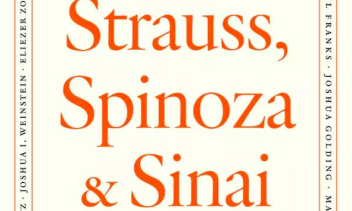An Introductory Word About Lists
Before I started writing Top 5 lists for Mishpacha Magazine, I was writing book lists. Not that I had that many people who cared or were interested. But during my years in yeshiva, I started writing a book list for like-minded yeshiva students who were interested in learning more about Jewish studies, philosophy, and psychology. At the time those were the subjects I was most interested in.
Soon afterward, while I was in college, I learned about the world of JSTOR, a repository of academic articles. But that expanded my interests further.
Usually when you look back on your youthful accomplishments and ideas, there’s a tendency to cringe. Especially, when your twenty-something-year-old self was probably also trying to show the world how smart he was.
But I don’t feel that way about this list. I am actually quite proud of it, and by and large, these books continue to play a role in my life. They were some of the first serious works of scholarship that shaped my ideas. Maybe some of my frummer warnings in the list below haven’t quite held up, but overall this is a great overview of the works that shaped who I am today.
So, I hope you enjoy this list.
And if you are interested, we are asking 18Forty guests, friends, and listeners, to share the books that made them. Please share the books that made you and tell us why and how they did. Here’s a link to The Books that Made You.
So without further ado, here’s my original book list:
Some Interesting Books & Articles
Having trouble coming up with a story or anecdote? Looking for more background in history, psychology, or philosophy? Here are some books, with brief descriptions, that might help you prepare sessions or develop as a more substantive educator.
Psychology
- Love’s Executioner & Other Tales of Psychotherapy by Irving Yalom
- The introduction to this book is crucial listing the “four givens” for successful psychology.
- Some of the stories deal with issues of sexuality (for instance, Ch. 10 “In Search of the Dreamer”). Just skip them. The intro is most important.
- Sanity and Sanctity: Mental Health Work Among the Ultra Orthodox in Jerusalem by David Greenberg and Eliezer Witztum
- The Road Less Traveled by M. Scott Peck
- This book was recommended to me by both R’ Beryl Gershenfeld and R’ Ezra Neuberger
- Part 4 in the book deals with clear Christian themes, they should be skipped.
- Opening Skinner’s Box: Great Psychological Experiments of the Twentieth Century by Lauren Slater.
- Stumbling on Happiness by Daniel Gilbert
- An extremely powerful and insightful book about the science and psychology of happiness and our conceptions of our past, future and present.
Jewish History & Sociology
- Jew vs. Jew: The Struggle For The Soul Of American Jewry by Samuel G. Freedman
- This is a fantastic presentation of the main issues facing American Judaism. The issues are presented first in the form of a (true) story in which the issue was manifest, and then afterwards the specific arguments for each position are presented.
- The epilogue has a very moving argument for the authenticity and necessity of Orthodox Judaism in America (keep in mind Samuel Freedman is a Conservative Jew).
- American Judaism: A History by Jonathan Sarna
- THE definitive history of American Judaism.
- The Shul Without a Clock, Tales out of Shul (both) by Emanuel Feldman
- Very insightful and oftentimes humorous discussion of Judaism coping with America.
- Rupture and Reconstruction: The Transformation of Contemporary Orthodoxy by Haym Soloveitchik (Tradition, Vol. 28, No. 4)
- How Jewry adapted and coped following the Holocaust.
- How Judaism differs from how it was practiced in Europe.
- One of the most commented upon articles published in the history of Tradition. This article deals with the change in the structure and nature of the Jewish community and their method of transmission of values and law.
– A must read for those going into the pulpit (ModOx balebatim love to hock about this!)
- The Haredim: A Defense by Aharon Rose (Azure 25, Summer 2006)
- A refreshingly positive perspective on the Haredi community written by an academic and former Belzer Hasid. Even for those opposed to the Haredi community, it cannot be properly critiqued until its positive values are clearly defended.
- Also a must read for future rabbis and community leaders who want a cogent and well balanced response to those who refer to “the Haredim” with the same tone as “The Measles”
- By His Light: Character and Values in the Service of God by Aharon Lichtenstein (Adapted by Reuven Ziegler)
- See specifically his essay “Centrist Orthodoxy: A Spiritual Accounting”
- The Book and the Sword: A Life of Learning in the Shadow of Destruction by David Weiss Halivni
- Most notably, it is vital to read his letter of resignation to the staff at JTS when they decided to ordain women (pg. 110). Very moving.
- Very authentic presentation of life in a European shtetl.
- Between the Yeshiva World and Modern Orthodoxy: The Life and Works of Rabbi Jehiel Jacob Weinberg by Marc B. Shapiro
- Some say the book has a “modernist” agenda, I found it informative and interesting.
- Between Berlin and Slobodka: Jewish Transition Figures from Eastern Europe by Hillel Goldberg
- Great portrait of Rabbis Yisroel Salanter, Yitzchok Hutner, YB Soloveitchik, and Joseph Lipovitz, and Professors Harry Wolfson and AJ Heschel.
- The Quest for Authenticity: The Thought of Reb Simhah Bunim by Michael Rosen
- A very ‘frum’ yet scholarly presentation of Reb Simcha Bunim’s thought and how he differed and innovated from previous Hasidic schools of thought.
- His thought is especially relevant for yeshiva bochurim because most Hasidic thought that has trickled into the Litvishe world is a product of Reb Simcha Bunim. Some of his disciples (and their disciples) include: The Kotzker, Ger, and Izbitzer (from whom R’ Tzadok, and later R’ Hutner and R’ Dessler, were influenced by) Rebbes.
- The Rebbe’s Army: Inside the World of Chabad-Lubavitch by Sue Fishkoff
- Like it or not, Chabad is one of the most powerful forces in Judaism. This book explains why.
Philosophy
- An Introduction to the History of Psychology by B.R. Hergenhahn
- Though it’s a bit pricey (it’s a textbook), this is by far the most comprehensive, easy to read presentation for the history of psychology and philosophy from its early Greek roots to present day issues.
- Godel, Escher, Bach: An Eternal Golden Braid by Douglas Hofstadter
- The book is a bit complex but for those interested it is a profound and fascinating discussion of the essence of the human mind.
- Discusses the nature of “meaning” and “consciousness.”







